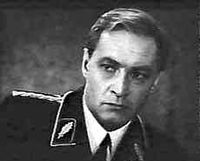- Stirlitz
-
Stirlitz The Stirlitz novels character 
Stirlitz, portrayed by Vyacheslav Tikhonov in Seventeen Moments of Spring.First appearance No Password Required, 1966 novel Last appearance Isaev, 2009 television series Created by Yulian Semyonov Portrayed by Rodion Nakhapetov (1967)
Daniil Strakhov (2009)
Vladimir Zamansky (1968)
Vyacheslav Tikhonov(1973)
Vladimir Ivashov (1975)
Vsevolod Safonov (1976)
Uldis Dumpis (1980)
Vasily Antonov (2001)Voiced by Vyacheslav Tikhonov (1984) Information Aliases Bruno, Bolsen, Max, Massimo etc. Gender Male Occupation Secret agent Title NKGB Colonel / SS-Standartenführer Family Vladimir Vladimirov (father)
Olesia Prokopchuk (mother)Spouse(s) Alexandera Gavrilin Children Alexander Vladimirov Nationality Soviet Max Otto von Stirlitz (Russian: Шти́рлиц, IPA: [ˈʂtʲirlʲɪt͡s]) is the lead character in a popular Russian book series written in the 1960s by novelist Julian Semyonov and of the television adaptation Seventeen Moments of Spring, starring Vyacheslav Tikhonov, as well as in feature films, produced in the Soviet era, and in a number of sequels and prequels. Other actors portrayed Stirlitz in several other films. Stirlitz has become a stereotypical spy in Soviet and post-Soviet culture, similar to James Bond in Western culture.
Contents
Character
In the universe of the Seventeen Moments of Spring, Stirlitz is the cover name for a Soviet superspy Colonel Maxim Maximovich Isaev (Макси́м Макси́мович Иса́ев), whose "real" name is Vsevolod Vladimirovich Vladimirov (Все́волод Влади́мирович Владимиров)[1].
Stirlitz takes a key role in Adolf Hitler's SS headquarters in Berlin during World War II. Working deep undercover, Stirlitz tries to collect intelligence about the Germans' war plans and communicate it to Moscow. He receives instructions from Moscow on how to proceed, on one occasion travelling to Switzerland on a secret mission.[2] He diverts the German nuclear "Vengeance Weapon" research program into a fruitless dead-end, thwarts peace talks between Nazi Germany, the United Kingdom and the United States, engages in intellectual games with members of the Nazi high command and sacrifices his own happiness for the good of his motherland. Despite being wracked with desire to return home to his wife he subordinates his feelings to his duty, thus embodying an idealised Soviet vision of patriotism.[3]
Stirlitz is quite an opposite of the action-oriented James Bond; most of the time he gains his knowledge without any Bond-style stunts and gadgets, while in the film adaptation of the stories the action is presented through a narrative voice-over by Yefim Kopelyan.[4] He is presented in a deeply patriotic but non-ideological light, fighting to defend the Soviet motherland against external enemies rather than just defending the communist regime against its ideological opponents.[5]
Influences in Russian life and culture
Although Stirlitz was a much-loved character, he was also the butt of a common genre of Russian jokes, often satirising his deductive trains of thought, with unexpected twists, delivered in the deadpan style of the voice-overs in the film adaptations; for example:
Stirlitz approaches Berlin. The city is veiled in smoke from the fires. "Forgot to switch off the iron again," thought Stirlitz with slight irritation.[6]Stirlitz continues to be a popular character in modern Russia. Despite the fact that references and Stirlitz jokes still penetrate contemporary speech, Seventeen Moments of Spring is very popular mainly because it is quite patriotic. It is repeated annually on Russian television, usually around Victory Day.[4] Stirlitz also continues to have a political significance. When his portrayer Vyacheslav Tikhonov died in December 2009, the Foreign Intelligence Service – one of the successor organisations of the former Soviet KGB – sent its condolences to his family.[7] Ivan Zassoursky notes that Russian Prime Minister (and former President) Vladimir Putin, a former KGB agent, has been portrayed as "embod[ying] the image – very important for the Russian television audience – of Standartenführer von Stirlitz... If anyone missed the connection between Putin, who served in Germany, and von Stirlitz, articles in the press reminded them of the resemblance and helped create the association."[3] The connection went both ways; Putin was strongly influenced by the novels, commenting: "What amazed me most of all was how one man's effort could achieve what whole armies could not."[5]
Stirlitz movies contributed a number of catchphrases, such as "Character: nordic, robust" (Характер — нордический, выдержанный, a personal characteristic, usually mocking or ironic).[8]
Novels with Stirlitz
Work Years portrayed Years of writing Бриллианты для диктатуры пролетариата (Diamonds for the Dictatorship of the Proletariat) 1921 1974—1989 Пароль не нужен (Password Not Needed) 1921—1922 1966 Нежность (Tenderness) 1927 1975 Испанский вариант (Spanish Variant) 1938 1973 Альтернатива (Alternative) 1941 1978 Третья карта (Third Card) 1941 1973 Майор «Вихрь» (Major "Whirlwind") 1944—1945 1968 Семнадцать мгновений весны (Seventeen Moments of Spring) 1945 1969 Приказано выжить (The Order is to Survive) 1945 1982 Экспансия — I (Expansion - Part I) 1946 1984 Экспансия — II (Expansion - Part II) 1946 1987 Экспансия — III (Expansion - Part II) 1947 Отчаяние (Despair) 1947 1990 Бомба для председателя (A Bomb for the Chairman) 1967 1970 See also
Notes and references
- ^ According to the first novel about him, "Diamonds for the Dictatorship of the Proletariat"
- ^ Beumers, Birgit (2005). Pop culture Russia!: media, arts, and lifestyle. ABC-CLIO. p. 196. ISBN 9781851094592.
- ^ a b Zassoursky, Ivan (2004). Media and power in post-Soviet Russia. M.E. Sharpe. pp. 132–134. ISBN 9780765608642.
- ^ a b Beumers, p. 180
- ^ a b Sakwa, Richard (2009). Putin: Russia's choice. Routledge. p. 6. ISBN 9780415407656.
- ^ Beumers, p. 181
- ^ "Soviet Union's favorite 'spy' dies aged 81". RIA Novosti. 2009-12-04. http://en.rian.ru/russia/20091204/157100764.html.
- ^ "Large Dictionary: Catch Phrases of the National Cinema" (Большой словарь: Крылатые фразы отечественного кино) 2001, ISBN 5765417353, p. 321
Categories:- Fictional secret agents and spies
- Cinema of the Soviet Union
- Fictional German people
- Fictional Nazis
- Fictional colonels
Wikimedia Foundation. 2010.
